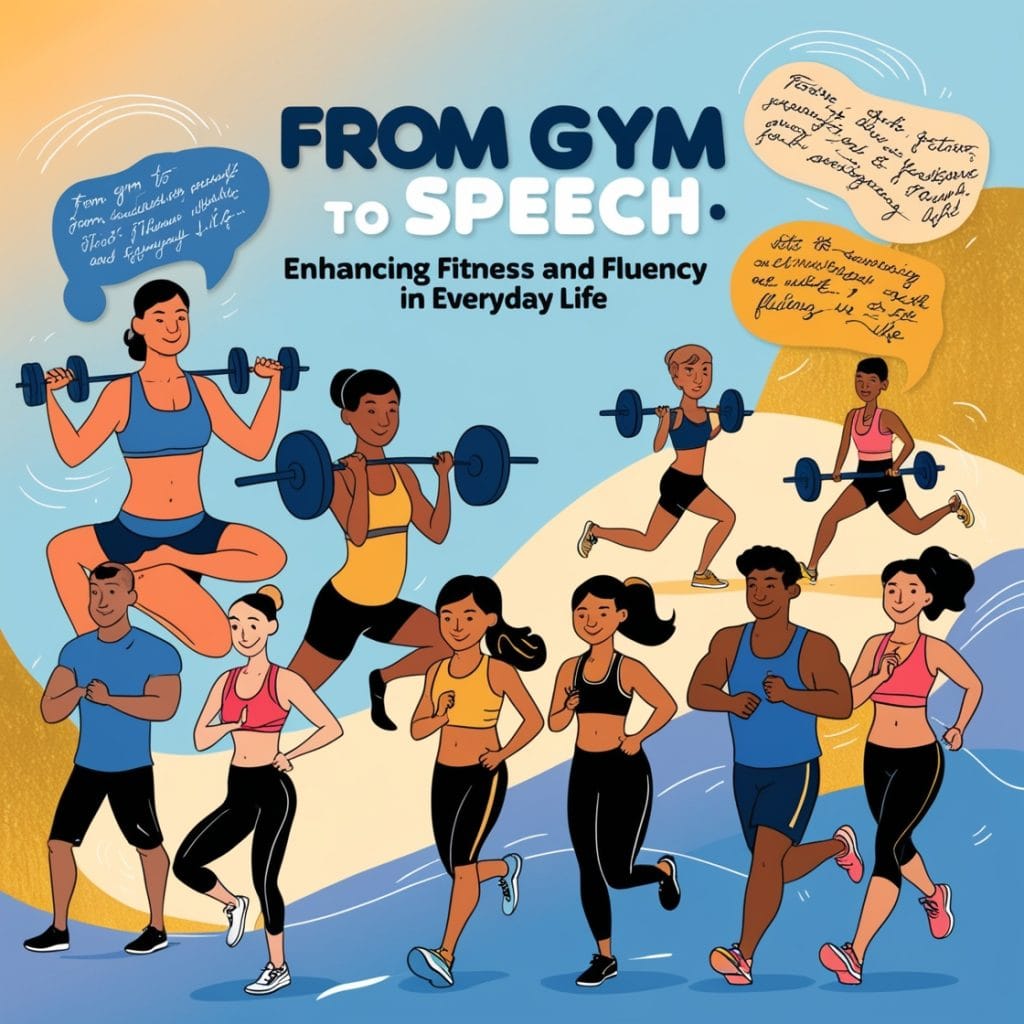From Gym to Speech: Enhancing Fitness and Fluency in Everyday Life

From Gym to Speech: Enhancing Fitness and Fluency in Everyday Life. In our busy modern lives, we often think of fitness and fluency as separate concepts—one related to physical health and the other to mental agility. But what if these two areas could actually enhance one another? The truth is, physical fitness and mental fluency are more closely connected than we might think. Exercise not only strengthens our body but also sharpens our mind, helping us become more articulate, quick-thinking, and better able to express ourselves in daily life. Whether it’s delivering a presentation at work, engaging in a casual conversation, or simply thinking on your feet, the benefits of fitness extend far beyond the gym and directly influence your ability to communicate effectively. Let’s explore how staying active can boost both your physical and cognitive fluency.
1. Exercise Improves Mental Clarity and Focus
It’s no secret that a good workout can clear your mind, but the impact of exercise on fluency goes much deeper than just clearing away mental fog. Regular fitness activities—especially aerobic exercises like running, swimming, or cycling—help increase blood flow to the brain. This improved circulation delivers more oxygen and nutrients, which in turn boosts cognitive function and enhances mental clarity.
When your mind is sharp, you’re better able to focus during conversations or presentations. Whether you’re trying to recall facts, solve problems on the fly, or simply express your thoughts clearly, a fit body supports a fit mind. You’ll find that you can maintain focus for longer periods, articulate your ideas more fluidly, and be more present in the moment. Regular exercise, particularly in the morning, can even set a positive tone for the day, ensuring that you tackle tasks with a clear, sharp mindset.
2. Physical Activity Reduces Stress, Leading to Better Communication

Stress has a huge impact on both our physical well-being and our ability to communicate effectively. When we’re anxious or stressed, it’s much harder to be articulate or to think on our feet. However, physical fitness plays a crucial role in managing stress. Exercise helps regulate the release of cortisol, the hormone associated with stress, and promotes the production of endorphins, the body’s natural mood enhancers. (Read More: Transform Your Body in 2024: The Benefits of Consistent Workouts at a Fitness Gym).
The result? Less anxiety and more confidence in both your body and mind. Whether you’re giving a speech, engaging in a conversation, or responding to a question at work, a relaxed, calm state allows you to speak more clearly and with greater fluency. With regular exercise, your stress levels are lower, and you can communicate more effectively, both verbally and non-verbally. The endorphins from exercise also contribute to a more positive outlook, making interactions with others feel more effortless and enjoyable.
3. Exercise Enhances Cognitive Flexibility and Adaptability

One of the key aspects of fluency—whether in speech, thought, or problem-solving—is the ability to adapt quickly to new information or changing circumstances. This is known as cognitive flexibility, and it’s something that can be directly influenced by physical activity. When you engage in regular exercise, particularly those that require coordination and balance (like yoga, dance, or sports), you help your brain develop a greater capacity for cognitive flexibility. (Read More: What Makes ‘Anytime Fitness Near Me’ Stand Out Among Local Gyms?).
For instance, activities that challenge your coordination and reaction time (such as playing tennis or doing HIIT workouts) train your brain to think and react faster, making it easier to switch between tasks or adjust to new situations. This enhanced adaptability translates directly into fluency in conversations, speeches, and other social or professional interactions. The more adaptable and agile your brain is, the quicker and more naturally you can communicate in real-time, whether you’re navigating a debate or simply explaining your ideas.
4. Fitness Boosts Memory and Learning Ability

Memory plays a major role in fluency, particularly when it comes to recalling facts, sharing anecdotes, or maintaining a flow in conversation. The good news is that physical fitness can significantly boost both short-term and long-term memory. Studies show that regular exercise, especially cardiovascular activities, increases the production of brain-derived neurotrophic factor (BDNF), a protein that promotes the growth of neurons and supports memory function.
A fit body supports a fit brain, and a well-maintained brain is better equipped to store, retain, and retrieve information. This can enhance your ability to speak fluently because you’ll have more confidence in recalling relevant details, remembering names, or retrieving key points during presentations. Whether you’re giving a speech or having a casual chat, a well-exercised brain makes it easier to access information and express yourself clearly and confidently.
5. Exercise Encourages Better Sleep, Which Improves Cognitive Performance
One of the often-overlooked benefits of regular fitness is its impact on sleep. A good night’s sleep is essential for cognitive function, including focus, memory, and fluency. Sleep allows the brain to consolidate memories, clear away toxins, and restore energy. However, poor sleep can lead to difficulty concentrating, a slower processing speed, and challenges in articulating thoughts clearly. (Read More: Top Fitness Blender Workouts for Busy Professionals in 2024).
Exercise, especially aerobic activity, promotes better sleep quality by regulating your body’s circadian rhythm. Those who exercise regularly fall asleep faster, enjoy deeper sleep, and wake up feeling more refreshed. As a result, your brain functions at a higher level the next day, making it easier to stay mentally alert, think on your feet, and communicate fluently. Better sleep also means that your mind is more capable of processing information and coming up with creative solutions on the fly, whether at work or in social settings.
Conclusion article From Gym to Speech: Enhancing Fitness and Fluency in Everyday Life
Incorporating fitness into your daily routine doesn’t just benefit your physical health—it also has a profound impact on your cognitive fluency. Regular exercise sharpens the mind, improves focus and memory, reduces stress, and promotes mental flexibility—all of which contribute to more fluid and confident communication. Whether you’re preparing for a big presentation or simply trying to have a more engaging conversation with a friend, staying active will give you the tools you need to perform at your best, both physically and mentally.
By connecting fitness with fluency, you’re not just improving your body’s endurance, but also strengthening your ability to think, adapt, and express yourself with confidence. So, the next time you lace up your sneakers, remember that you’re not only working on your physical health—you’re also building the foundation for clearer, quicker, and more effective communication in every area of your life.






1 thought on “From Gym to Speech: Enhancing Fitness and Fluency in Everyday Life”
Comments are closed.